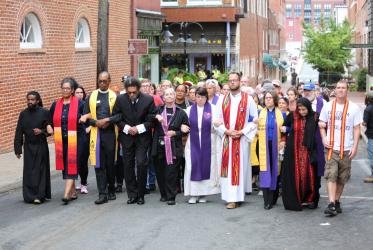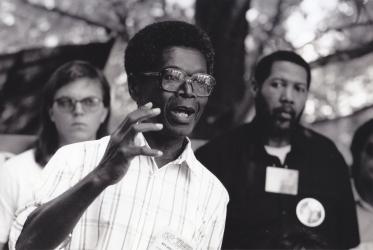Catholic and World Council of Churches (WCC) leaders, meeting in Rome to discuss ways of combating racism and xenophobia, have pledged to uphold the rights and dignity of migrants and refugees.
The World Conference on Xenophobia, Racism and Populist Nationalism in the Context of Global Migration concluded on 20 September with an audience in the Vatican with Pope Francis. The three-day encounter was jointly organised by the WCC and the Vatican’s Office for Integral Human Development, in collaboration with the Pontifical Council for Promoting Christian Unity.
Participants from many different Christian churches discussed practical ways in which local parishes and dioceses can support migrants and refugees. They also reflected on the fears which give rise to xenophobia and the theological foundations which oblige Christians to denounce such racist attitudes and actions.
Among the African church leaders taking part in the meeting was Rev. Kenneth Mtata, general secretary of the Zimbabwe Council of Churches. He explained how the questions of xenophobia, racism and populist nationalism are rooted in fundamental fear, “a fear that is so deep that you also need deep answers”. Such answers, he said, can be found in theological and biblical reflection, since the idea of addressing the fear of those who are different from ourselves runs throughout the Bible.
After confronting the underlying ideas, he continued, it’s important to move on to address practical issues of policy and structures, questions of “how we organise and order society” and how we can influence others to heal the sickness in society.
Since the church tends to reflect that illnesses, he added, we must speak with humility and recognise that we face the same challenges within our churches. But he described it as “heretic” to say that we are followers of Jesus Christ “while continuing to see others as “not full human beings”. Such attitudes, he said, are “completely contrary to our identity as Christians.”
Scriptures, Mtata said, are full of stories of people on the move, including the story of Jesus who begins his life as a migrant, and the “appropriate Christian response is to take care of those people”. Just as God took the risk of becoming a human being, so taking the risk of “identifying with those in vulnerable situations truly identifies us with God”.
Mtata also talked about the many African immigrants who move to other countries on the continent and also face exclusion and racist violence from vulnerable local communities.
Speaking about the “journey of transition” of his native country, Zimbabwe, Rev. Mtata said the church is calling for a process of serious engagement and dialogue. But such a fragmented society, he added, must also “take account of the hurts that come from the past” since so many people lost their lives, their relatives, or their position through violence.
The international community, he concluded, must also play an important role in ending the isolation that has had an impact “more on ordinary people than on the political elite”.
Despite the current outbreak of cholera which is affecting those with inadequate water and medical supplies, he said, Zimbabwe is undergoing “birth pains, so the church must continue to act, not only at humanitarian level but also in tackling the fragmentation of the past.”
Listen to the audio interview with Rev. Kenneth Mtata
Pope Francis dialogs with Christian leaders on combating racism (WCC news release 20 September 2018)







